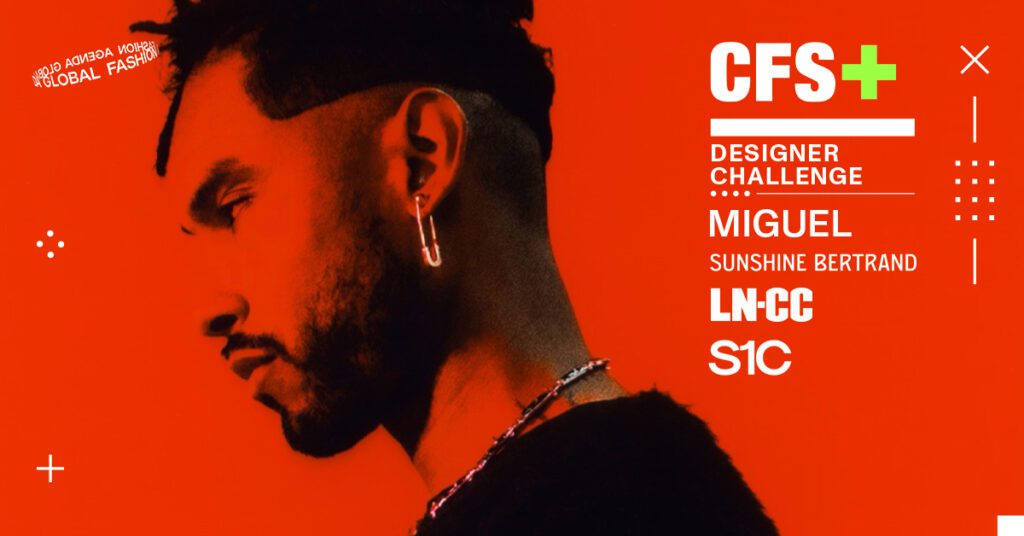FINDING SUSTAINABLE METHODS AND MATERIALS TO CREATE SUNGLASSES
CFS+ 2021: Designer Challenge MIGUEL

FINDING SUSTAINABLE METHODS AND MATERIALS TO CREATE SUNGLASSES
CFS+ 2021: Designer Challenge MIGUEL

For 2021 the Designer Challenge sought to find solutions in sunglasses, one of the most over-looked products when it comes to sustainability in fashion.
The problems:
With these issues in mind, the Designer Challenge set out to find a sustainable method and materials to create sunglasses that would show the wider industry that it can be done, and demonstrate to citizens that affordable and sustainable eyewear solutions are possible.
Miguel is not only a global musical recording and performance artist best known for celebrating his multi-cultural background, he recently launched Schedule 1 Concepts (S1C), a streetwear brand that utilises sustainable, ethics-driven practices in fashion production.
“I launched S1C because I couldn’t find what I wanted to wear,” says Miguel. “I know millions of people are trying to find the same thing as me without sacrificing their unique style. I want to be of service and educate people about why sustainable fashion is important and learn in the process. My belief is, if it doesn’t exist, just make it.”
“Sunglasses are one of my favourite items, you can use them to express yourself and protect your eyes. The function is there, and great sunglasses make a statement, they convey the energy of what you believe in.”
Miguel brought his drive for sustainability to Global Fashion Agenda in partnership with Sunshine Bertrand, whose eyewear design studio is committed to evolving the eyewear category towards a more responsible future, and retailer LN-CC, which is a progressive retail concept, combining a unique art-based installation store in London and an online platform run with a forward-thinking approach.
Miguel’s designs were inspired by sunglasses he has loved throughout his life; ones that feel right, now for Miguel and his 3 million strong community. Y2K Versace and Oakley, and the signature graphic black wraparound shades worn by rapper Eazy-E of N.W.A went into the design blender.
What emerged using the know-how of Sunshine Bertrand was a crystal clear Cat’s Eye frame with mood-enhancing blue lenses, and two Televisioni inspired frames – one black with uplifting red lenses, the other tortoishell with sunny orange lenses – finished with etched SC1 logo on the wide set arm.
With designs created, all that remained was to get them made with sustainable materials, using production methods with minimal Greenhouse Gas Emissions (GHG).
The initial material selected to create the frames was the versatile Acetate RenewTM, from Italian manufacturer Mazzuccelli 1849, a sheet plastic made from virgin flake that is waste product from the plastic industry. For the lenses the team wished to use fully-recyclable glass lenses by Italian glass producers Barberini.
However, in both cases, a small production run was not possible due to minimum order quantities. In addition, the need for Schedule 1 Concepts to have costly certification in order to use Acetate RenewTM also prevented the use of this material for this challenge and held up production of the final frames. “For small businesses, minimum orders mean they often have to buy more than they know they can sell, resulting in waste,” says Sunshine Bertrand. To complete the challenge, the team had to find different materials.
Mazzuccelli 1849 stepped forward with M49, their bioplastic made using cellulose acetate and a plasticizer of vegetable origin. M49 has been used to create the S1C frames. The mood-enhancing coloured lenses are Sunlens Sustainable Polyamide by Zeiss, which, while not 100% perfect, are an important step in the right direction as they use 39% bio-based materials, and their carbon footprint is 50% less than a standard lens. The Designer Challenge exposed the current barriers to producing sustainable sunglasses at scale, and that, particularly for small designers, it is difficult to overcome the red-tape set in place by large manufacturers.
The main learning from this Designer Challenge has been how much innovation and investment is still needed in the eyewear industry,” says Christina Iskov Senior Programme Manager, Design and Innovation at Global Fashion Agenda. “I hope this Designer Challenge can be a call for action in the eyewear industry to offer more sustainable solutions to a wider audience.”